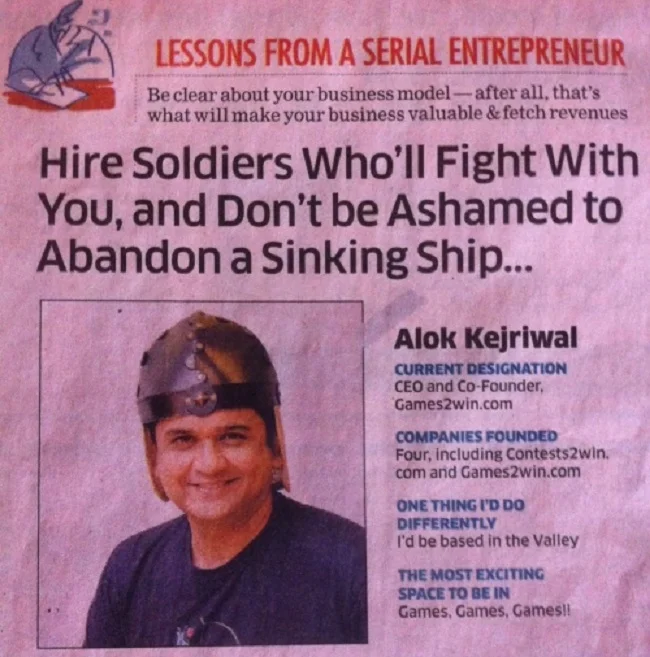Alok Kejriwal is one of the mentors on MakeIndiaWork – the startup ecosystem by MonsterIndia.com to support and encourage startups. Here Alok shares the 5 immortal lessons while starting up, executing, operating and exiting companies.
A few months after I started Contests2win.com – my first start up (in 1998), I got an offer to sell it. I called up my lawyer for advice. He sounded excited and said, “Alok, sell your business and buy yourself a new car.”
Thankfully I did not follow his advice and have the honour of writing this column for you.
The past 14 years have been fun! I’ve managed to start companies and sell two of them. My medal of honour is that I sold my last company Mobile2win to the great Walt Disney Company.
While starting up, executing, operating and exiting my companies, I have learnt the following 5 immortal lessons:
1. Hire Soldiers, not Rock Stars.
Some of the people I employed way back in 1998 are still with me. They are the best performing professionals I know. When I hired them, they were passionate, anxious to learn and ready to go. They were soldiers ready to march. They were not qualified with acronyms or degrees or ‘work-ex’ and all that jazz. They had a fire in them that would only be satiated by hard, grueling work.
The mistake I made was that I also hired some ‘Rock Stars’. These were spoilt corporate professionals who came on stage to sing their own song. They had rulebooks and silly ideas, all learnt in business school. They had egos that were larger than King Kong. These guys added no value to my business; instead created disruption.
Lesson – Hire ungroomed, hungry people to work with you when you start digging the trenches. You don’t need a Prime Minister to be part of your gang.
2. Understand what Business Model really means.
A lot of entrepreneurs I meet are quick to blurt out, “Sir, my revenue model is x or y.” When I ask them what their ‘business model’ is, they seem flummoxed and mumble, “Isn’t that the same thing?”
Well, it’s not! A business model is what will make your business valuable. A revenue model may or may not be a part of the business model!
Let’s take Google as an example. The business model that the founders had in mind was to make searching the Internet as easy as the two times table. Just type and go.
The founders intuitively knew that if they could make search very easy and simple, Google would become a major habit of everyone in the world, and that habit would create ‘value’. Well, it did and how!
Much later, Google began to offer ‘Ad Words’, ‘Ad Sense’ and a host of features to advertise on Google. This became their revenue model – an important part of their business model.
Lesson – Business Model is what will ultimately create value. Get that right first.
3. Don’t let a VC choose you. Instead, you choose the VC.
I developed clinical blood pressure owing to a duel between a VC and my co-founder in Mobile2win. Both of them hated each other. The VC was so vindictive that they wanted to close down the business just to teach my co-founder a lesson!
This was entirely my fault. I allowed this VC to enter my company just because they wanted in. I was naïve, foolish and also a ‘Bhikari’ (penniless beggar). I had no source of funds and when Count Dracula came along, I happily offered my neck.
It took a good two and a half years to keep Mobile2win running. I even managed to prevent my co-founder and VC from committing murder. Later I let go of my co-founder, hired a CEO and turned the company around. That business was acquired by Disney!
Lesson – Conduct due diligence on VCs. Talk to entrepreneurs who have been funded by them before. Ask them how it is to share a bathroom with them. Then make a decision.
4. Think like a Founder, not like a CEO.
A start up founder is like God. She takes care of everything and everyone. She can see things coming and can prevent disasters.
CEOs on the other hand, are execution folks. They get things done. They are ruthless, cursed people who behave like excavation truck drivers in a cemetery. They need not be the founder.
Pierre Omidyar – the visionary entrepreneur, who created eBay, was a great start up founder! He set up eBay and made it a very useful and scalable business. But when the time came to take eBay to the ultimate level, he turned it over to Meg Whitman – a professional CEO.
Lesson – Start your company and then quickly decide if you are CEO material or not. If you aren’t, hire a capable CEO and feel proud about your decision – not guilty!
5. Don’t be silly.
If ‘Titanic’ was to be made into a Bollywood movie, I can visualize these scenes: The ‘hero’ would rush into the boiler room and try to stop the water from gushing in by using his strong muscular shoulders! All along he would urge his love to escape. Then in the end, he would swim out, meet her and dance to a song on a lifeboat.
That’s silly and stupid.
Lesson – Don’t be silly and stupid when it comes to your start up. If you see a disaster; save your life and abandon ship. Closing down a business that’s not working is an act of bravery, not shame. And remember, you can always start up again!
Alok blogs at therodinhoods.com – the community of entrepreneurs he has founded.
This article was originally published on The Economic Times.




